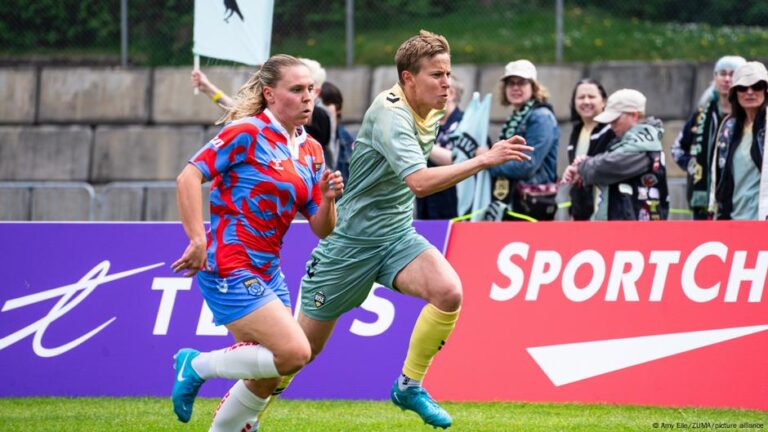Lara Schenk has never been one to be afraid of upping roots to pursue a new challenge in a foreign land. So perhaps it is not that surprising that the 25-year-old German took a leap of faith earlier this year, signing on to play in the world’s newest women’s professional soccer league, the Northern Super League (NSL).
Since crossing the pond in April, Schenk has established herself in the starting 11 of the Montreal Roses, one of the NSL’s six founding clubs.
For the only German player in Canada’s topflight, who describes herself as a “two-footed and aggressive defender,” the move is another milestone in her already remarkable career.
“Making history is always a unique experience,” Schenk told DW. “It makes me very proud to be the first German player in the league here and to be part of the very first season. With the launch of a new league in Canada, we are finally setting a milestone for North America, promoting women’s soccer beyond the USA and Mexico.”
For Schenk, who most recently played for Spanish second-division club CD Sporting Club de Huelva, North America is familiar territory, having left Germany in 2018 to attend Harvard University – where she played for the Harvard Crimson women’s team.
“Back then, I saw a role model in (Germany forward) Laura Freigang, who went to college in the USA as a youth national team player. I followed her,” Schenk said. “I would 100% make the same decision again today.”
First pro contract in Belgium
During her time at Harvard, Schenk, who represented Germany at youth level, not only earned a degree, but also co-founded a section of “Athlete Ally,” a group that advocates for the inclusion of LGBTQIA+ athletes in college sports.
Having completed her degree, in December 2022, the product of Wolfsburg’s youth program signed her first professional contract with the women’s section of Belgian club FC Bruges. A year later, she moved on to RSC Anderlecht, with whom she won the Belgian Super League.
European leagues ‘can “learn from Canada’
Now in Canada, Schenk sees the NSL as “a very good mix of the European and the typically North American athletic style of football.”
However, the professional structures, which allow players to fully concentrate on their performance on the pitch, are particularly important and Schenk sees the NSL as a role model in this regard.
“I believe that the smaller European leagues, in particular, can learn a lot from our league,” Schenk said.
“The interest from officials, investors, and fans is simply there. I haven’t experienced that to the same extent in Europe. If you want to further develop women’s football in Europe, standard contracts, minimum wages, and professional conditions must be in place in the leagues.”
Professional framework
This is precisely what the NSL, which describes itself on its website as “a revolution” offers, as it aspires to build a league that “the next generation can believe in.”
The driving force behind the establishment of the NSL is former pro Diana Matheson who was part the Canadian teams that won bronze medals at the 2012 and 2016 Summer Olympics. She also spent eight seasons as a player in the National Women’s Soccer League (NWSL) in the United States.
Matheson describes the opportunity to start a professional league from scratch as a “gift” – and she took the opportunity to ensure that provisions like extended maternity leave and a ban on transferring players without their consent are written in to standard NSL player contracts. Such provisions make the league appealing to a player like Schenk.
Solid planning for a long-term future
“In the Canadian league, we know that an injury or pregnancy doesn’t immediately result in uncertainty and contractual problems,” Schenk said.
“Diana Matheson and co have done a great job, and I am impressed by the Canadian officials and the Canadian national team, who have built this league solidly and planned for a long-term future.”
For her part though, Schenk is focused on the more immediate future. With the top four teams qualifying for the playoffs, the Roses, currently second in the table, look a good bet to make it to the postseason. Even if the Roses don’t make it to the final at Toronto’s BMO Field on November 15, Schenk already feels like a winner.
“For me personally, it remains a dream to just be a professional footballer and to experience and help shape the growth of women’s football worldwide.”
This article was originally published in German.


